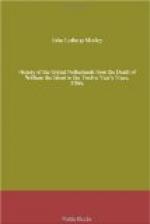The Prince observed that when, two or three years before, he had sent his master an account of the coasts, anchoring-places, and harbours of England, he had then expressed the opinion that the conquest of England was an enterprise worthy of the grandeur and Christianity of his Majesty, and not so difficult as to be considered altogether impossible. To make himself absolutely master of the business, however, he had then thought that the King should have no associates in the scheme, and should make no account of the inhabitants of England. Since that time the project had become more difficult of accomplishment, because it was now a stale and common topic of conversation everywhere—in Italy, Germany, and France— so that there could be little doubt that rumours on the subject were daily reaching the ears of Queen Elizabeth and of every one in her kingdom. Hence she had made a strict alliance with Sweden, Denmark, the Protestant princes of Germany, and even with the Turks and the French. Nevertheless, in spite of these obstacles, the King, placing his royal hand to the work, might well accomplish the task; for the favour of the Lord, whose cause it was, would be sure to give him success.
Being so Christian and Catholic a king, Philip naturally desired to extend the area of the holy church, and to come to the relief of so many poor innocent martyrs in England, crying aloud before the Lord for help. Moreover Elizabeth had fomented rebellion in the King’s Provinces for a long time secretly, and now, since the fall of Antwerp, and just as Holland and Zeeland were falling into his grasp, openly.
Thus, in secret and in public, she had done the very worst she could do; and it was very clear that the Lord, for her sins; had deprived her of understanding, in order that his Majesty might be the instrument of that chastisement which she so fully deserved. A monarch of such great prudence, valour, and talent as Philip, could now give all the world to understand that those who dared to lose a just and decorous respect for him, as this good lady had done, would receive such chastisement as royal power guided by prudent counsel could inflict. Parma assured his sovereign, that, if the conquest of England were effected, that of the Netherlands would be finished with much facility and brevity; but that otherwise, on account of the situation, strength and obstinacy of those people, it would be a very long, perilous, and at best doubtful business.




